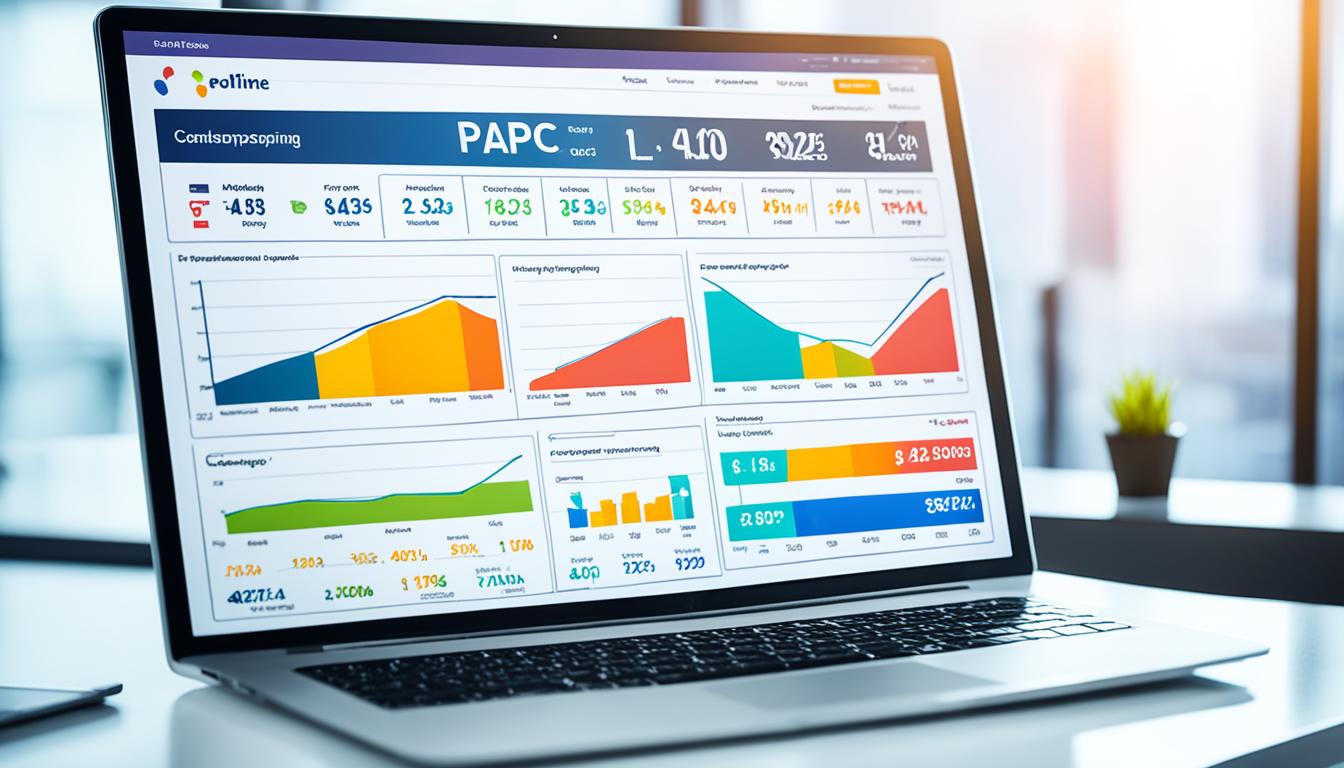Did you know that businesses with a well-defined marketing plan have a 313% higher likelihood of achieving their goals than those without one? Having a strong marketing strategy is essential for boosting growth and effectively reaching your target audience. This article will guide you through the marketing planning process, providing valuable tips and templates to help you create an impactful marketing plan for your business.
Key Takeaways:
- A documented marketing plan increases your chances of success by 313%.
- A well-defined marketing strategy is essential for driving growth and reaching your target audience effectively.
- In this article, we will guide you through the marketing planning process and provide valuable tips and templates to help you create a successful marketing plan for your business.
What is a Marketing Plan and Why Do You Need One?
In the world of business, a well-crafted marketing plan is essential for success. A marketing plan serves as a comprehensive roadmap that outlines your marketing strategy, objectives, and tactics. It helps you effectively allocate resources, identify target audiences, and implement marketing initiatives that drive business growth.
But why exactly do you need a marketing plan? The answer lies in its ability to provide clarity, focus, and direction. A marketing plan ensures that you have a clear understanding of your goals and how to achieve them. It helps you stay on track, make informed decisions, and measure your progress along the way.
Understanding the Purpose of a Marketing Plan
The purpose of a marketing plan is to provide a structured framework for your marketing activities. It helps you define your target market, analyze competitors, and establish a unique value proposition. By understanding your target audience and their needs, you can tailor your marketing messages and tactics to effectively reach and engage them.
Benefits of Implementing a Marketing Plan
Implementing a marketing plan offers a range of benefits for your business. Firstly, it enables you to align your marketing activities with your overall business objectives, ensuring that every effort contributes to the growth and success of your company. Secondly, a marketing plan helps you allocate resources wisely, maximizing your return on investment. Finally, a well-executed marketing plan enhances brand awareness, builds customer loyalty, and drives revenue.
Key Components of an Effective Marketing Plan
An effective marketing plan consists of several key components:
- Market research: Understand your target audience, their preferences, and behaviors.
- Marketing objectives: Set clear and measurable goals for your marketing efforts.
- Target market analysis: Identify your ideal customers and develop customer profiles.
- Competitor analysis: Evaluate your competitors’ strengths, weaknesses, and strategies.
- Marketing strategies: Choose the most effective tactics to reach your target audience.
- Budget and timeline: Allocate resources and establish a realistic timeline for implementation.
- Measurement and evaluation: Define metrics to track and evaluate the success of your marketing initiatives.
How to Tailor Your Marketing Plan for Different Business Types
Every business is unique, and marketing plans should be tailored to specific business types and industries. Depending on whether you run a B2B or B2C business, your marketing strategies, channels, and messaging may differ. Additionally, factors such as size, location, and target audience demographics can influence your marketing approach. It is essential to consider these factors when developing and implementing your marketing plan.
Free Marketing Plan Templates to Get You Started
Creating a marketing plan from scratch can be a daunting task. To help you get started, we have curated a collection of free marketing plan templates. These templates provide a framework and guidance for crafting your marketing plan, saving you time and effort. You can customize these templates to suit your specific business needs, ensuring that your marketing plan is comprehensive and effective.
Types of Marketing Plans: Choosing the Right Strategy for Your Business
In this section, we will explore different types of marketing plans and help you choose the right strategy for your business. Whether you are a small business owner or part of a larger organization, having a well-defined marketing plan is crucial for success. By understanding the various types of marketing plans and their unique benefits, you can make informed decisions about which strategies will best align with your business goals.
Comparing Traditional Marketing Plans with Digital Marketing Strategies
When it comes to marketing, there are two primary approaches: traditional marketing and digital marketing. Traditional marketing involves traditional media channels such as print, television, radio, and direct mail. It relies on offline strategies to reach the target audience.
On the other hand, digital marketing leverages digital channels such as websites, social media platforms, email marketing, and search engine optimization (SEO) to connect with customers. Unlike traditional marketing, digital marketing allows for more precise targeting and offers the advantage of real-time data and analytics.

Implementing Social Media Marketing in Your Plan
Social media marketing has become an essential component of any modern marketing plan. Platforms like Facebook, Instagram, Twitter, and LinkedIn offer a vast reach and the ability to engage with your target audience directly. By developing a strategic social media marketing plan, you can effectively build brand awareness, drive traffic, and generate leads.
Crafting an Effective Marketing Campaign
A marketing campaign is a coordinated series of marketing efforts designed to achieve a specific goal. It often involves a combination of different marketing tactics and channels, such as advertising, content marketing, email marketing, and social media. Crafting an effective marketing campaign requires careful planning, compelling messaging, and engaging creative elements to capture the attention of your target audience and achieve the desired outcomes.
Developing a Marketing Plan for Small Business
Small businesses have unique marketing needs and often operate with limited resources. Developing a marketing plan specifically tailored to the needs of a small business can help maximize the impact of marketing efforts while minimizing costs. This includes identifying target markets, understanding customer pain points, and selecting the most effective marketing channels within budgetary constraints.
Integrating Content Marketing into Your Overall Strategy
Content marketing is a strategic approach focused on creating and distributing valuable, relevant, and consistent content to attract and retain a clearly-defined audience. By integrating content marketing into your overall marketing strategy, you can establish thought leadership, build trust with your audience, and drive organic traffic to your website. This involves creating a content calendar, conducting keyword research, and developing high-quality content across various formats, such as blog posts, videos, infographics, and white papers.
By exploring different types of marketing plans and understanding their respective strategies, you can choose the right marketing approach for your business. Whether you opt for traditional marketing, digital marketing, or a combination of both, it’s important to align your marketing efforts with your business goals, target audience, and available resources.
How to Write a Comprehensive Marketing Plan: Step-by-Step Guide
Setting Clear Marketing Goals and Objectives
One of the first steps in creating a comprehensive marketing plan is defining clear goals and objectives. These goals will serve as the foundation of your marketing strategy and guide your decision-making process. Whether you want to increase brand awareness, generate leads, or boost sales, it’s essential to set SMART (Specific, Measurable, Achievable, Relevant, and Time-bound) goals that are aligned with your overall business objectives.
Start by identifying the key performance indicators (KPIs) that you will use to measure the success of your marketing efforts. These may include website traffic, conversion rates, social media engagement, or customer acquisition costs. Once you have established your goals and KPIs, you can develop strategies and tactics to achieve them.
Allocating a Marketing Budget and Resources
In order to implement your marketing plan effectively, you need to allocate a budget and resources. Start by determining how much you are willing to invest in your marketing efforts. Consider factors such as advertising costs, marketing software and tools, and the salaries of your marketing team members. It’s important to allocate your budget strategically, focusing on the channels and tactics that will generate the highest return on investment (ROI).
Additionally, take into account the resources you have available, such as personnel, time, and expertise. Determine whether you will hire internal staff or outsource certain marketing tasks. Remember that investing in the right resources will help you execute your marketing plan more efficiently and achieve better results.
Identifying the Most Effective Marketing Channels for Your Business
Once you have defined your goals and allocated your budget, it’s time to identify the most effective marketing channels for your business. Consider your target audience and their preferences, as well as the nature of your products or services. Some common marketing channels include:
- Social media platforms (e.g., Facebook, Instagram, LinkedIn)
- Email marketing
- Search engine optimization (SEO)
- Pay-per-click (PPC) advertising
- Content marketing
Conduct market research and competitor analysis to determine which channels are most likely to reach your target audience and achieve your marketing goals. It’s also important to continuously monitor and evaluate the performance of your marketing channels, making adjustments as necessary to optimize your results.
Building a Strong Marketing Team and Organizational Structure
A successful marketing plan requires a strong marketing team and organizational structure. Determine the roles and responsibilities within your marketing team, ensuring that each member has the necessary skills and expertise to contribute effectively. Consider your business size and budget when determining the size of your team.
Collaboration and communication are key to a cohesive marketing team. Foster a culture that encourages teamwork and open communication, allowing ideas to flow freely and creativity to thrive.
Creating a Digital Marketing Plan to Leverage Online Opportunities
In today’s digital age, having a digital marketing plan is crucial to leverage online opportunities and reach your target audience effectively. A digital marketing plan includes strategies and tactics specifically tailored to online platforms and channels. This may include:
- Search engine marketing (SEM)
- Social media advertising
- Content creation and distribution
- Website optimization
- Online partnerships and collaborations
By leveraging the power of digital marketing, you can expand your reach, engage with your audience, and drive business growth.

| Step | Description |
|---|---|
| Step 1 | Set clear marketing goals and objectives |
| Step 2 | Allocate a marketing budget and resources |
| Step 3 | Identify the most effective marketing channels for your business |
| Step 4 | Build a strong marketing team and organizational structure |
| Step 5 | Create a digital marketing plan to leverage online opportunities |
Key Elements to Include in Your Marketing Plan
When developing a marketing plan, it’s essential to consider the key elements that will drive the success of your strategy. In this section, we will explore the fundamental components that should be included in your marketing plan to ensure its effectiveness and impact on your business.
Understanding the Marketing Mix: Product, Price, Place, and Promotion
The marketing mix refers to the combination of product, price, place, and promotion that forms the foundation of any marketing plan. Each element plays a crucial role in shaping your overall strategy and influencing consumer behavior.
“The marketing mix is like a recipe for success. It helps you create a blend of the right product, at the right price, in the right place, and with the right promotion.”
By understanding and strategically implementing each component of the marketing mix, you can effectively target your audience, differentiate your offering from competitors, and create compelling marketing campaigns.
Utilizing Marketing Software and Tools to Enhance Your Strategy

In today’s digital age, marketing software and tools play a crucial role in enhancing your marketing strategy. These tools can assist with various aspects of your marketing efforts, including market research, data analysis, content creation, social media management, and campaign tracking.
By utilizing marketing software and tools, you can streamline your processes, automate tasks, gain valuable insights, and ultimately optimize your marketing activities for better results.
Implementing Different Marketing Initiatives to Drive Growth
A successful marketing plan includes a variety of initiatives that work together to drive growth for your business. These initiatives can range from traditional advertising campaigns to online content marketing strategies and influencer collaborations.
- Advertising: Utilize advertising channels such as TV, radio, print, and online platforms to reach your target audience and create brand awareness.
- Content Marketing: Develop valuable and engaging content to attract and nurture potential customers, positioning your brand as an authoritative source in your industry.
- Social Media Marketing: Leverage social media platforms to engage with your audience, build brand loyalty, and drive traffic to your website or physical store.
- Email Marketing: Implement targeted email campaigns to nurture leads, promote products or services, and drive conversions.
- Influencer Marketing: Collaborate with influencers or industry experts to expand your reach, gain credibility, and tap into new customer segments.
- Event Marketing: Organize or participate in industry events, trade shows, or conferences to showcase your brand, network with industry professionals, and generate leads.
Developing Successful Marketing Tactics and Actionable Steps
While marketing initiatives provide the overarching strategy, successful marketing tactics and actionable steps are essential for execution. These tactics outline the specific actions you’ll take to implement your marketing initiatives and achieve your goals.
When developing marketing tactics, consider the following:
- Target Audience: Identify who your target audience is and tailor your tactics to reach and resonate with them effectively.
- Channels: Determine the most effective marketing channels to reach your target audience, whether it’s through social media, search engine optimization, traditional advertising, or others.
- Timelines: Establish timelines and deadlines to ensure timely execution of your tactics and track progress.
- Resources: Allocate the necessary resources, including budget, personnel, and technology, to support your tactics.
How to Track and Measure the Success of Your Marketing Plan
Tracking and measuring the success of your marketing plan is crucial to evaluate its effectiveness and make data-driven decisions for future strategies. By monitoring key performance indicators (KPIs) and leveraging analytics tools, you can gain valuable insights into your marketing efforts and make necessary adjustments.
Some common KPIs to consider when tracking your marketing plan’s success include:
- Website traffic and engagement
- Conversion rates
- Lead generation and customer acquisition
- Social media metrics (followers, likes, shares)
- Customer satisfaction and retention
- Return on investment (ROI)
| KPI | Measurement |
|---|---|
| Website Traffic | Number of unique visitors and page views |
| Conversion Rates | Percentage of website visitors who take a desired action (e.g., make a purchase, fill out a form) |
| Lead Generation | Number of leads generated through marketing efforts |
| Social Media Metrics | Number of followers, likes, shares, comments, and engagement rate |
| Customer Satisfaction | Surveys, feedback, and reviews |
| Return on Investment (ROI) | Revenue generated compared to marketing expenses |
By regularly monitoring these metrics and analyzing the data, you can gauge the success of your marketing plan and make informed decisions to optimize your strategy going forward.
Creating a Winning Marketing Plan for 2021: Emerging Trends and Future Strategies
In today’s rapidly evolving digital landscape, it is crucial for businesses to stay ahead of the game by creating a winning marketing plan that incorporates emerging trends and future strategies. To ensure your marketing efforts are effective and driving business growth, it is important to adapt to new consumer behaviors and preferences, utilize data-driven insights, incorporate innovative marketing techniques, align with evolving industry trends, and measure the impact of your marketing plan on business growth and revenue.
Adapting Your Marketing Plan to New Consumer Behaviors and Preferences
Consumer behaviors and preferences are constantly evolving, influenced by technological advancements, social and cultural changes, and economic fluctuations. To create a winning marketing plan for 2021, it is essential to understand these shifts and adapt accordingly. Analyze consumer data, conduct market research, and stay updated on the latest consumer trends to identify new opportunities and tailor your marketing strategies to meet changing customer needs and expectations.
Utilizing Data-Driven Insights to Enhance Your Marketing Efforts
Data plays a vital role in shaping marketing strategies and decision-making. By utilizing data-driven insights, you can gain a deeper understanding of your target audience, their behaviors, preferences, and purchasing habits. Leverage analytics tools, customer surveys, and social listening to gather valuable data that will inform your marketing strategies. Use this data to optimize your campaigns, personalize your messaging, and deliver relevant content that resonates with your audience.
Incorporating Innovative Marketing Techniques for Enhanced Engagement
Innovation is the key to capturing consumers’ attention and standing out in a crowded marketplace. Explore and experiment with innovative marketing techniques to enhance engagement and drive results. Consider leveraging emerging technologies such as augmented reality, virtual reality, and artificial intelligence to create immersive and personalized experiences for your target audience. Embrace influencer marketing, user-generated content, and interactive campaigns to foster brand loyalty and increase customer engagement.

How to Align Your Marketing Plan with Evolving Industry Trends
The marketing landscape is constantly evolving, with new trends and strategies emerging regularly. To stay competitive, it is essential to align your marketing plan with these evolving industry trends. Stay updated on the latest marketing trends, attend industry events and conferences, and network with experts to gain insights and inspiration. Embrace new platforms, channels, and technologies that are gaining popularity in your industry and find innovative ways to incorporate them into your marketing plan.
Measuring the Impact of Your Marketing Plan on Business Growth and Revenue
Measuring the impact of your marketing plan is crucial for evaluating its effectiveness and making data-driven adjustments for future success. Set clear goals and key performance indicators (KPIs) to measure the impact of your marketing efforts on business growth and revenue. Utilize web analytics, social media metrics, and sales data to track your progress and assess the ROI of your marketing initiatives. Regularly review and analyze your results to identify areas for improvement and optimize your marketing strategies.
Conclusion
Throughout this article, we have explored the process of creating a successful marketing plan and provided valuable insights, tips, and templates to help you along the way. A marketing plan plays a vital role in driving business growth by outlining your goals, strategies, and tactics to effectively reach your target audience. By implementing the steps and strategies outlined in this article, you will be well-equipped to create a comprehensive marketing plan that will set your business up for success.
Key takeaways from this article include the importance of setting clear marketing goals and objectives, allocating a budget and resources, identifying effective marketing channels, and building a strong marketing team. We have also discussed the significance of incorporating data-driven insights, utilizing innovative techniques, and aligning your marketing plan with emerging industry trends. Remember, a well-crafted marketing plan coupled with continuous monitoring and evaluation will allow you to make informed decisions and drive business growth.
In conclusion, creating a successful marketing plan requires careful planning, implementation, and adaptation. With a clear understanding of your business objectives and target audience, you can develop a comprehensive marketing plan that will not only drive results but also help you stay ahead of the competition. Use the insights and strategies shared in this article to create a marketing plan tailored to your business needs, and watch as it sets you on the path to success.
FAQ
What is a Marketing Plan and Why Do You Need One?
A marketing plan is a strategic document that outlines your marketing goals, objectives, and strategies to reach your target audience and drive business growth. It is essential because it serves as a roadmap for your marketing efforts and helps align your team towards a common goal.
What are the Benefits of Implementing a Marketing Plan?
Implementing a marketing plan provides several benefits, including better organization and focus, improved decision-making, enhanced brand visibility, increased customer engagement, and higher chances of achieving your marketing goals.
What are the Key Components of an Effective Marketing Plan?
An effective marketing plan consists of key components such as a detailed analysis of your target market, clear marketing goals and objectives, a thorough understanding of your competition, a well-defined marketing strategy, a budget and resource allocation plan, and a timeline for implementation and evaluation.
How can I Tailor My Marketing Plan for Different Business Types?
To tailor your marketing plan for different business types, consider factors such as your industry, target audience, geographical location, and available resources. It’s important to customize your strategies and tactics to suit the unique needs and objectives of your business.
Are there any Free Marketing Plan Templates Available?
Yes, there are numerous free marketing plan templates available online that can help you kickstart your marketing planning process. These templates provide a framework for organizing your ideas and ensure you cover all the necessary components of a comprehensive marketing plan.
What are the Types of Marketing Plans I can Choose from?
The types of marketing plans you can choose from include traditional marketing plans, which focus on print media, television, and other traditional advertising methods, and digital marketing strategies, which encompass online platforms, social media, content marketing, and email marketing.
How can I Integrate Social Media Marketing into My Marketing Plan?
To integrate social media marketing into your marketing plan, identify the social media platforms that align with your target audience, set measurable objectives for your social media campaigns, create engaging and relevant content, and leverage social media analytics to track and optimize your performance.
How can I Write a Comprehensive Marketing Plan?
To write a comprehensive marketing plan, start by setting clear marketing goals and objectives, conducting market research to understand your target audience, determining your marketing budget and resource allocation, selecting the most effective marketing channels, and crafting actionable strategies and tactics.
What are the Key Elements to Include in My Marketing Plan?
The key elements to include in your marketing plan are the marketing mix (product, price, place, and promotion), the utilization of marketing software and tools, the implementation of various marketing initiatives, the development of successful marketing tactics and actionable steps, and the tracking and measurement of your marketing plan’s success.
How can I Create a Winning Marketing Plan for 2021 and Beyond?
To create a winning marketing plan for 2021 and beyond, adapt your marketing plan to new consumer behaviors and preferences, utilize data-driven insights to enhance your efforts, incorporate innovative marketing techniques for enhanced engagement, align your plan with evolving industry trends, and measure the impact of your plan on business growth and revenue.








